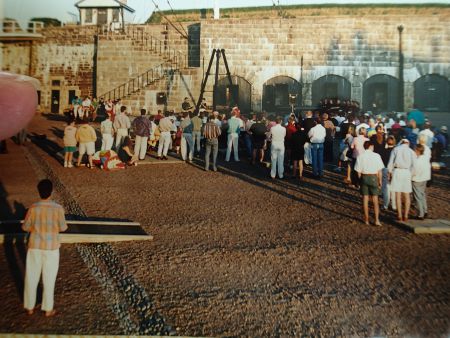KJIPUKTUK (Halifax) - Less than thirty years ago people living with HIV/AIDS in Canada agitated against widespread prejudice, ignorance and stigmatization in society and government. This was while treatment was in its infancy and people with AIDS were dying at horrific rates.
In Nova Scotia Eric Smith, a South Shore schoolteacher living with HIV, was banned from the classroom after parents threatened to keep their children at home.
Also in Nova Scotia, Simon Thwaites was discharged from the Navy for being HIV-positive. He successfully fought the discharge in a precedent-setting case arguing that discrimination based on disability is a human rights' violation.
Both Smith and Thwaites suffered much abuse during their ordeals, but refused to just go away.
Extensive interviews with Thwaites and Smith are now featured on a new website that documents this period. Transcripts and videos of interviews, as well as photos, meeting minutes and so on, all can be found here. The website covers major urban centres in Canada, but in the fight against AIDS Halifax and rural Nova Scotia held their own.
“It is really important for us to remember this period,” says queer activist Gary Kinsman, one of the people behind the project. “This wasn't just a somber, dismal time, it was also a time when people were able to come together, to show compassion, to go and sit with people who were dying, to show them support and respect, and to make sure that their needs were being met.”
Nova Scotia, although isolated, played an important role, Kinsman says, pointing to the People With AIDS Coalition as one of the first groups in Canada to give an authentic voice to people living with HIV/AIDS.
But as AIDS organizations became more regulated, and as treatments became more effective, memories faded.
That's regrettable, because there are lessons for today's activists, Kinsman believes.
“We were able to engage in direct action forms of political activism that actually changed the world for people living with AIDS and HIV, that improved their situations dramatically,” he says. “That is why these stories are really important to get out there.”
“Despite the hardship and stigma HIV/AIDS produced in people's lives, in terms of how it was socially organized and directed against homosexuals and drug users and sex workers, people were able to come together and to focus their anger,” he says. “They were able to politicize and radicalize that anger and actually engage in actions that were effective, that brought about results.”
Apart from Ann Silversides' book on Michael Lynch, and some scholarly articles, there is very little information to be found on this topic, says Kinsman.
“This isn't something we are very good at,” Kinsman explains. “Official history certainly does not communicate it to people, the mass media does not communicate it, and within our own communities and within our own activist networks we are not always good at inter-generational communication of what happened in the past.”
So Kinsman, together with co-researcher Alexis Shotwell and a team of Carleton University students, set to work to fill the gap.
It's a work in progress, Kinsman and his team are eager to hear from anybody who has memories or artifacts to share.
“It's not an academic project, and we're not trying to write the definitive history. What we are trying to do is make these people's stories and experiences available to others. So people can learn from them, and interact with them.”
Check out the AIDS Activist History Project
Follow Robert Devet on Twitter @DevetRobert



